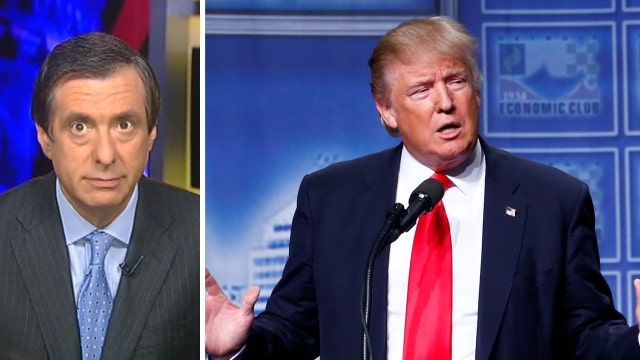Kurtz: N.Y. Times admits press is against Trump
'MediaBuzz' host Howard Kurtz reacts to members of the media attempting to justify why their reporting is so negative towards Donald Trump
The media’s legions of Trump-bashers are finally acknowledging the obvious.
And trying their best to justify it.
But there’s one problem: Tilting against one candidate in a presidential election can’t be justified.
This is not a defense of Donald Trump, who has been at war with much of the press since he got in the race. Too many people think if you criticize the way the billionaire is being covered, you are somehow backing Trump.
And it’s not about the commentators, on the right as well as the left, who are savaging Trump, since they are paid for their opinions.
This is about the mainstream media’s reporters, editors and producers, whose credo is supposed to be fairness.
And now some of them are flat-out making the case for unfairness—an unprecedented approach for an unprecedented campaign.
Put aside, for the moment, the longstanding complaints about journalists being unfair to Republicans. They never treated Mitt Romney, John McCain, George W. Bush or Bob Dole like this.
Keep in mind that the media utterly misjudged Trump from the start, covering him as a joke or a sideshow or a streaking comet that would burn itself out. Many of them later confessed how wrong they had been, and that they had missed the magnitude of the anger and frustration that fueled Trump’s unlikely rise.
But since the conventions, and fueled by his own missteps, Trump has been hit by a tsunami of negative coverage, all but swamping the reporting on Hillary Clinton. Liberal investigative journalist Glenn Greenwald recently told Slate that “the U.S. media is essentially 100 percent united, vehemently, against Trump, and preventing him from being elected president”—and, given his views, he has no problem with that.
Now comes Jim Rutenberg, in his first season as media columnist for the New York Times. He’s a good reporter and I give him credit for trying to openly grapple with this bizarre situation.
But Rutenberg is, in my view, trying to defend the indefensible:
“If you view a Trump presidency as something that’s potentially dangerous, then your reporting is going to reflect that. You would move closer than you’ve ever been to being oppositional. That’s uncomfortable and uncharted territory for every mainstream, nonopinion journalist I’ve ever known, and by normal standards, untenable.”
Yet normal standards, says Rutenberg, may not apply.
By “closer to being oppositional,” he means openly siding against Trump and thereby helping Clinton. And that’s precisely the kind of thing that erodes our already damaged credibility. If a reporter believes Trump is a threat to America, he or she should go into the opinion business, or quit the media world and work against him. You can’t maintain the fig leaf of neutral reporting and favor one side.
Rutenberg acknowledges that “balance has been on vacation since Mr. Trump stepped onto his golden Trump Tower escalator last year to announce his candidacy. For the primaries and caucuses, the imbalance played to his advantage, captured by the killer statistic of the season: His nearly $2 billion in free media was more than six times as much as that of his closest Republican rival.”
I have to push back on this $2-billion argument. Trump got more coverage not just because he was good for clicks and ratings, but because he did many, many times more interviews than anyone else running. Much of this “free” media, rather than being a gift, was harshly negative. But that too helped Trump, because he drove the campaign dialogue and openly campaigned against the press.
Next Rutenberg argues that Trump is just too over the top in his rhetoric:
“And while coded appeals to racism or nationalism aren’t new — two words: Southern strategy — overt calls to temporarily bar Muslims from entry to the United States or questioning a federal judge’s impartiality based on his Mexican heritage are new.”
What’s disappointing is that Rutenberg doesn’t cite a single example of biased coverage from his paper, or any other paper or news outlet. (He does point to criticism from MSNBC’s Joe Scarborough, who is, as the columnist acknowledges, a commentator.)
Instead he quotes Carolyn Ryan, the Times’ senior editor for politics, as saying Trump’s candidacy is “extraordinary and precedent-shattering” and “to pretend otherwise is to be disingenuous with readers.”
And Rutenberg agrees, saying it would “be an abdication of political journalism’s most solemn duty: to ferret out what the candidates will be like in the most powerful office in the world.”
No one wants to abdicate that duty. No one is pretending Trump’s candidacy isn’t extraordinary. No one is saying he shouldn’t be fully vetted.
But there is an assumption among many journalists and pundits that of course Hillary Clinton is qualified, she’s been around forever, she just doesn’t need the relentless reporting that Trump requires. And so critical stories about Clinton—even when she said she “short-circuited” in that Chris Wallace interview on the email mess—are overshadowed by the endless piling on Trump.
Many of the reporters who feel compelled to stop Trump are undoubtedly comfortable because all their friends feel the same way.
But they are deluding themselves if they think that going after one candidate in a two-candidate race is what journalism is about.





